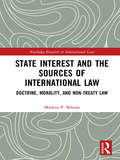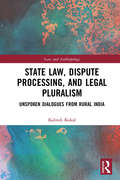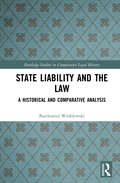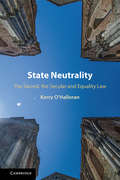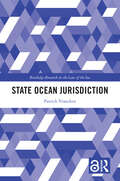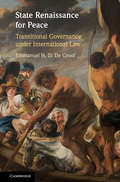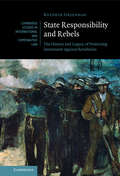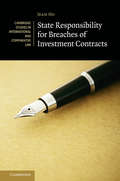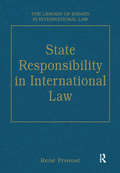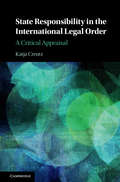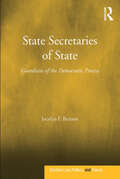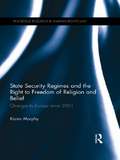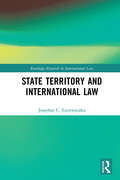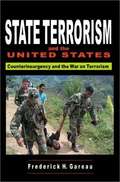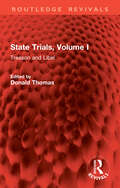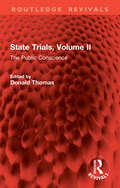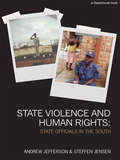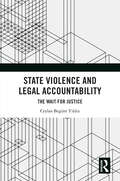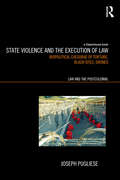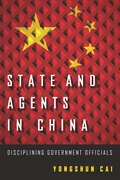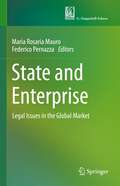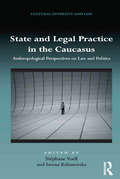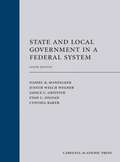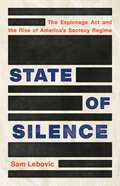- Table View
- List View
State Interest and the Sources of International Law: Doctrine, Morality, and Non-Treaty Law (Routledge Research in International Law)
by Markus P. BehamThis book addresses the disparity between positive non-treaty law and its scholarly assessment in the area of moral concepts, understood as altruistic as opposed to reciprocal legal obligations. It shows how scholars are generously willing to assert the existence of a rule of international law, thereby moving further away from actual state practice, not taking into account the factors of legal rhetoric and the core survival interests of the state in the formation of custom and general principles of law. The main argument is that such moral concepts can simply not manifest themselves as non-treaty sources of international law from a dogmatic perspective. The reason is the inherent connection between the formation of the non-treaty sources of international law and state interest that makes it difficult, if not impossible, to assess state practice or opinio juris in the case of altruistic obligations. The book further demonstrates this finding by looking at two cases in point: Human rights and humanitarian exceptions to the prohibition of force. As opposed to the majority of existing works on the subject, State Interest and the Sources of International Law takes a bigger-picture approach to a number of distinct problems in international law scholarship by looking at the building blocks of international relations on the one hand, and merging this with sources doctrine on the other. It will be of interest to researchers, academics, and students in the fields of international law, human rights, international relations, political science, legal philosophy, and legal theory.
State Law, Dispute Processing And Legal Pluralism: Unspoken Dialogues From Rural India (Law and Anthropology)
by Kalindi KokalThis book presents an ethnography of dispute processing by non-state forums and actors in rural India. As such it sheds light on a much neglected and contested topic. Arising in the context of recent legal and political debates that question the legitimacy of non-state actors engaged in dispute processing, the book explores the nature, form, and functioning of such forums and actors in two locations in rural India. Focusing on a fishermen’s community belonging to the caste of Hindu Machimār Koḷīs in coastal Maharashtra and an agrarian community in Uttarakhand with members from the Pandit, Thakur, Bhotiā, and Harijan caste groups, this study shows the manner in which non-state forums and actors engage with state law and its regulatory systems.
State Liability and the Law: A Historical and Comparative Analysis (Routledge Studies in Comparative Legal History)
by Bartłomiej WróblewskiThis book explores the historical foundations of holding public authorities accountable for their acts, and discusses how and why the idea that the state should or should not be held liable became established in three significant jurisdictions. The issue of state liability for legislative acts is considered one of the most difficult and controversial problems in jurisprudence. This book analyses the development of concepts and institutions of liability for the acts of legislator pertaining to the general principles of state liability until the mid-20th century in the leading European legal systems: Germany, France and Great Britain. It is shown that, in contrast to the prevailing conviction, the lack of liability for law-making instruments was not an unassailable dogma, and that questions as to whether such liability was possible were being asked from the Middle Ages onwards. The book will be a valuable resource for academics and researchers in the areas of Constitutional Law, Public Law, History of Law, History of Legal and Political Thought, Philosophy of Law, and Comparative Legal Studies.
State Neutrality: The Sacred, the Secular and Equality Law
by Kerry O'HalloranThe state is legally required to be neutral towards religion, but in many countries it is increasingly anything but. This book conducts a comparative legal analysis of the church–state relationship within and between western countries – including the USA, France and Israel – that are key players in international and domestic dynamics in which religion and religious conflict take centre stage. It analyses how government accommodates diversity, how policies of multiculturalism and pluralism translate into legislation, the extent to which they address matters of religion and belief and what pattern of related issues then come before the courts. Finally, it considers how civil society and democracy in general can maintain a balance between the interests of those of different religions and beliefs and those of none. In this illuminating study, Kerry O'Halloran shows how the relationship between religion and government affects civil society and the functioning of democracy in North America and Europe.
State Ocean Jurisdiction (Routledge Research on the Law of the Sea)
by Patrick Henri VranckenProposing a systematic analytical framework which assists in understanding and applying the international law regime governing State ocean jurisdiction with a view to improved ocean governance for sustainable development, this book distinguishes between, and focuses on, the form, the ground, the scope and the purpose of State ocean jurisdiction. Defining jurisdiction as the international-law authority of a State to be involved in a factual matter on the basis of a valid legal ground to perform authoritative acts impacting on that matter, it disaggregates the concept the complexity of which often leads to States failing to make full use of their existing ocean jurisdictions. In the process, it identifies when and to what extent there are gaps and overlaps of jurisdictions. Bringing clarity on an inevitably complex and often misunderstood framework that is aimed at striking a universally accepted balance of competing interests, the book lays the foundation for future research, contextualising the position of State ocean jurisdiction not only in terms of ocean governance, but in the whole of public international law. With an original systematic focus on State ocean jurisdiction, the book will be of interest to academics, students and practitioners working in the areas of international law of the sea, ocean governance, human rights and environmental law.
State Renaissance for Peace: Transitional Governance under International Law
by Emmanuel H. De GroofAfter 1989, the function of transitional governance changed. It became a process whereby transitional authorities introduce a constitutional transformation on the basis of interim laws. In spite of its domestic nature, it also became an international project and one with formidable ambitions: ending war, conflict or crisis by reconfiguring the state order. This model attracted international attention, from the UN Security Council and several regional organisations, and became a playing field of choice in international politics and diplomacy. Also without recourse to armed force, international actors could impact a state apparatus – through state renaissance. This book zooms in on the non-forcible aspects of conflict-related transitional governance while focusing on the transition itself. This study shows that, neither transitional actors nor external actors must respect specific rules when realising or contributing to state renaissance. The legal limits to indirectly provoking regime change are also being unveiled.
State Responsibility
by James CrawfordAnnexed to GA Resolution 56/83 of 2001, the International Law Commission's Articles on Responsibility for Internationally Wrongful Acts put the international law of responsibility on a sound footing. As Special Rapporteur for the second reading, James Crawford helped steer it to a successful conclusion. With this book, he provides a detailed analysis of the general law of international responsibility and the place of state responsibility in particular within that framework. It serves as a companion to The International Law Commission's Articles on State Responsibility: Introduction, Text and Commentaries (Cambridge University Press, 2002) and is essential reading for scholars and practitioners concerned with issues of international responsibility, whether they arise in interstate relations, in the context of arbitration or litigation, or in bringing international claims.
State Responsibility and Rebels: The History and Legacy of Protecting Investment Against Revolution (Cambridge Studies in International and Comparative Law #161)
by Kathryn GreenmanThis book traces the emergence and contestation of State responsibility for rebels during the nineteenth and early-twentieth centuries. In the context of decolonisation and capitalist expansion in Latin America, it argues that the mixed claims commissions-and the practices of intervention associated with them-served to insulate economic order against revolution, by taking the question of who assumed the risk of harm by rebels out of the scope of national authority. The jurisprudence of the commissions was contradictory and ambiguous. It took a lot of interpretive work by later scholars and codifiers to rationalise rules of responsibility out of these shaky foundations, as they battled for the meaning and authority of the arbitral practice. The legal debates were structured around whether the standard of protection against rebels owed to aliens was nationally or internationally determined and whether it was domestic or international authority that adjudicated such standard-a struggle over the internationalisation of protection against rebels.
State Responsibility for Breaches of Investment Contracts (Cambridge Studies in International and Comparative Law #136)
by Jean HoThere is a wealth of material that shapes the law of State responsibility for breaches of investment contracts. First impressions of an unsettled or uncertain law have thus far gone unchallenged. But unchallenged first impressions point to the need for a detailed study that investigates and analyses the sources, the content, the characteristics, and the evolution of this law. The argument at the heart of this monograph is that the law of state responsibility for breaches of investment contracts has carved a unique and distinct trajectory from the traditional route for the creation of international law, developing principally from arbitral awards, and mimicking, to a considerable extent, the general international law on the protection of aliens and alien property. This book unveils the remarkable journey of the law of state responsibility for breaches of investment contracts, from its origins, to its formation, to its arrival at the cusp of maturity.
State Responsibility in International Law (The Library of Essays in International Law)
by René ProvostIn the wake of the adoption by the International Law Commission of a complete set of articles on state responsibility in international law in 2001, this collection assembles a number of essays tracing key debates which have marked the evolution of this field over the last fifty years. These include explorations of the general theory of state responsibility (link between ’primary’ and ’secondary’ rules, the place of due diligence, the link between liability and wrongfulness), the consequences of an internationally wrongful act (nature of remedies, suitability of countermeasures, third states and the shift from bilateralism to community interests in the law of state responsibility), the debate over criminalizing state responsibility, and the continuing relevance of the law of injuries to aliens. The collection also contains a series of essays offering critical perspectives on state responsibility, including feminist and developing world perspectives. It is completed by an extensive and up-to-date bibliography.
State Responsibility in the International Legal Order: A Critical Appraisal
by Katja CreutzState responsibility in international law is considered one of the cornerstones of the field. For a long time it remained the exclusive responsibility system due to the primacy of States as subjects of international law. Its unique position has nonetheless been challenged by several developments both within and outside the international legal order, such as the rise of alternative responsibility ideas and practices, as well as globalization and its consequences. This book adopts a critical and holistic approach to the law of State responsibility and analyzes the functionality of the general rules of State responsibility in a changed international landscape characterized by the fragmentation of responsibility. It is argued that State responsibility is not equally relevant across the broad spectrum of international obligations, and that alternative constructions of responsibility, namely international criminal law and international liability, have increased in standing.
State Secretaries of State: Guardians of the Democratic Process (Election Law, Politics, And Theory Ser.)
by Jocelyn F. BensonNearly a decade after the 2000 Presidential elections invited a firestorm of questions about the sanctity of our democratic process, there continues to be a heightened interest in the role of state-wide elections officials, typically the state's Secretary of State - this book looks into their pivotal role in the promotion of a healthy democracy. Much past interest has resulted in overly critical coverage of election errors, ignoring the tireless efforts that ensure the American citizens benefit from a democratic, inclusive and accountable election process. Through a series of case studies, anecdotes, and interviews with current and recent secretaries, State Secretaries of State author Jocelyn Benson readdresses this balance by providing the first in-depth study of the Secretary's role in registering voters, enforcing voting laws and regulations, overseeing elections, and certifying results. As such, it represents a much-needed contribution to the study of US elections, both in practice and in law.
State Security Regimes and the Right to Freedom of Religion and Belief: Changes in Europe Since 2001 (Routledge Research in Human Rights Law)
by Karen MurphyThe question of to what extent, manifestations of religious beliefs should be permitted in the European public sphere has become a salient and controversial topic in recent years. Despite the increasing interest however, debates have rarely questioned the conventional wisdom that an increase in the range of security measures employed by a government inevitably leads to a decrease in the human rights enjoyed by individuals. This book analyses the relationship between state security regime changes and the right to religious freedom in the EU. It presents a comparative analysis of the impact these regime changes have had on the politics, policies and protections of religious freedom across the EU member states in the post-2001 environment. The book provides a timely investigation into the role of national legislation, the European Court of Human Rights, and societal trends in the protection of religious freedom, and in so doing demonstrates why the relationship between state security and religious freedom is one of the most socially significant challenges facing policymakers and jurists in Europe at the present time.
State Territory and International Law (Routledge Research in International Law)
by Josephat EzenwajiakuThis book proposes a re-interpretation of Article 2(4) of the Charter of the United Nations to read, or at least include, respect for the inviolability of State territory. While States purport to obey the prohibition of the Use of Force, they frequently engage in activities that could undermine international peace and security. In this book the author argues that State practice, opinio juris, as well as contentious and advisory opinions of the International Court of Justice, have promoted the first limb of Article 2(4). Although wars between States have decreased, the maintenance of international peace and security remains a mirage, as shown by the increase in intra- and inter-State conflicts across the world. The author seeks to initiate a rethinking of the provision of Article 2(4), which the International Court of Justice has described as the cornerstone of the United Nations. The author argues that the time is ripe for States to embrace an evolutive interpretation of Article 2(4) to mean respect, as opposed to the traditional view of the threat, or the use, of force. He also evaluates the discourse regarding territorial jurisdiction in cyberspace and argues that the efforts made by the international community to apply Article 2(4) to cyberspace suggest that the article is a flexible and live instrument that should be adjusted to address the circumstances that endanger international peace and security. This book will engineer a serious debate regarding the scope of Article 2(4), which before now has always been limited to the threat or use of force. As a result, it will be of interest to academics and students of public international law, as well as diplomats and policymakers.
State Terrorism and the United States: From Counterinsurgency to the War on Terrorism
by Frederick H. GareauAn analysis of America's involvement in training of foreign military.
State Trials, Volume I: Treason and Libel (Routledge Revivals)
by Donald ThomasState Trials, Volume I (first published in 1972) contains cases concerned with treason and the freedom of press gathered from the full edition of State Trials completed in 1826. The author has selected some of the most interesting and important trials for this volume.The book includes a general introduction, explaining the significance of State Trials as a whole. Each selected case is then introduced by a short essay, which explains the events surrounding the trial and its importance in relation to legal history. State Trials will always be one of the most vivid and fascinating accounts of English life in all documentary literature. Tales of murder, treason, bigamy, adultery, political conspiracy, the scandals of the prison system, and the brutality of imperial conquest are told through the words of the great and the humble. Murderers, pornographers, conquerors, and heroes, all come alive in their own words. This book will be a fascinating read for students and researchers of law and history, and general readers interested in the topic.
State Trials, Volume II: The Public Conscience (Routledge Revivals)
by Donald ThomasState Trials, Volume II (first published in 1972) contains cases concerned with witchcraft, the scandals of the prisons, and colonial administration gathered from the full edition of State Trials completed in 1826. The author has selected some of the most interesting and important trials for this volume.The book includes a general introduction, explaining the significance of State Trials as a whole. Each selected case is then introduced by a short essay, which explains the events surrounding the trial and its importance in relation to legal history. State Trials will always be one of the most vivid and fascinating accounts of English life in all documentary literature. Tales of murder, treason, bigamy, adultery, political conspiracy, the scandals of the prison system, and the brutality of imperial conquest are told through the words of the great and the humble. Murderers, pornographers, conquerors, and heroes, all come alive in their own words. This book will be a fascinating read for students and researchers of law and history, and general readers interested in the topic.
State Violence and Human Rights: State Officials in the South (Law, Development and Globalization)
by Andrew M. Jefferson Steffen JensenState Violence and Human Rights addresses how legal practices – rooted in global human rights discourse or local demands – take hold in societies where issues of state violence remain to be resolved. Attempts to make societies accountable to human rights norms regularly draw on international legal conventions governing state conduct. As such, interventions tend to be based on inherently normative assumptions about conflict, justice, rights and law, and so often fail to take into consideration the reality of local circumstances, and in particular of state institutions and their structures of authority. Against the grain of these analyses, State Violence and Human Rights takes as its point of departure the fact that law and authority are contested. Grounded in the recognition that concepts of rights and legal practices are not fixed, the contributors to this volume address their contestation 'in situ'; as they focus on the everyday practices of state officials, non-state authorities and reformers. Addressing how state representatives – the police officer, the prison officer, the ex-combatant militia member, the hangman and the traditional leader – have to negotiate the tensions between international legal imperatives, the expectations of donors, the demands of institutions, as well as their own interests, this volume thus explores how legal discourses are translated from policy into everyday practice.
State Violence and Legal Accountability: The Wait for Justice
by Ceylan Begüm YıldızThis book pursues a critical perspective on the phenomenon of state violence and its legal unaccountability.Focusing on the role of myths, assumptions and ghosts that surround the meaning of the state and performance of state violence, this book details a fresh perspective on that violence and its legal unaccountability. It asks: How does our understanding of the state reflect on the political demands and legal processes of accountability? To pursue this question, the book traces the political and legal aftermath of the police killing of a 14-year-old boy, Berkin Elvan, during the nationwide Gezi protests of the summer of 2013 in Turkey. Countering imaginaries of the state clash between the state officer’s attempt to attribute personal responsibility to Elvan for his own death and public demands for state accountability. Meanwhile, the prolonged legal process ensures that subjects who seek accountability find themselves in a long and exhausting legal battle which dominates their lives and transforms their subjectivity. As the Elvan family continues to wait for accountability and justice, this book suggests that waiting and suspense are key elements of legal performance in trials concerning state violence. As such, and unlike the usual reading of legal violence, which focuses on judgement, the book explores how this violence – and its implications for an understanding of justice and accountability – is bound to the very act of waiting.This critical interdisciplinary study of state violence and its legal handling will appeal to scholars and students from a wider range of disciplines including law, criminology, politics, sociology and political and legal philosophy.
State Violence and the Execution of Law: Biopolitcal Caesurae of Torture, Black Sites, Drones (Law and the Postcolonial)
by Joseph PuglieseState Violence and the Execution of Law stages a provocative analysis of how the biopolitical divide between human and animal has played a fundamental role in enabling state violence, including torture, secret imprisonment and killing-at-a-distance via drones. Analyzing the complex ways in which the United States government deploys law in order to consolidate and further imperial relations of power, Pugliese tracks the networks that enable the diffusion and normalization of the state’s monopoly of violence both in the US and in an international context. He demonstrates how networks of state violence are embedded within key legal institutions, military apparatuses, civilian sites, corporations, carceral architectures, and advanced technologies. The author argues that the exercise of state violence, as unleashed by the war on terror, has enmeshed the subjects of the Global South within institutional and discursive structures that position them as non-human animals that can be tortured, killed and disappeared with impunity. Drawing on poststructuralist, critical race and whiteness, and critical legal theories, the book is transdisciplinary in its approach and value. It will be invaluable to university students and scholars in Critical Legal and Socio-Legal Studies, Cultural Studies, Race and Ethnicity Studies, International Politics, and Postcolonial Studies.
State and Agents in China: Disciplining Government Officials
by Yongshun CaiChinese government officials have played a crucial role in China's economic development, but they are also responsible for severe problems, including environmental pollution, violation of citizens' rights, failure in governance, and corruption. How does the Chinese Party-state respond when a government official commits a duty-related malfeasance or criminal activity? And how does it balance the potential political costs of disciplining its own agents versus the loss of legitimacy in tolerating their misdeeds? State and Agents in China explores how the party-state addresses this dilemma, uncovering the rationale behind the selective disciplining of government officials and its implications for governance in China. By examining the discipline of state agents, Cai shows how selective punishment becomes the means of balancing the need for and difficulties of disciplining agents, and explains why some erring agents are tolerated while others are punished. Cai finds that the effectiveness of punishing erring officials in China does not depend so much on the Party-state's capacity to detect and punish each erring official but on the threat it creates when the Party-state decides to mete out punishment. Importantly, the book also shows how relaxed discipline allows reform-minded officials to use rule-violating reform measures to address local problems, and how such reform measures have significant implications for the regime's resilience.
State and Enterprise: Legal Issues in the Global Market
by Federico Pernazza Maria Rosaria MauroThis book addresses the regulation of the State/Enterprise relationship in the framework of international economic context. It analyzes this relationship from the discrete perspectives of conflict, cooperation, and integration in contributions by authors representing a diverse range of legal cultures and political backgrounds.The topic is investigated following three approaches:• State versus Enterprise (the State which bans, restricts, or regulates the activities of Enterprises, both domestic and foreign);• Enterprise versus State (the Enterprises, main actors of commercial, industrial or financial initiatives, which may directly or indirectly affect the legal and economic structure of the State);• State as Enterprise and Enterprise as State (public Enterprises under political control that pursue geopolitical goals, and Enterprises that rely on the political, financial, and strategic support of the State for their business expansion).Furthermore, the volume includes a special focus on the relationship State/Enterprise in non-capitalist economies (China, Russia, and Cuba).
State and Legal Practice in the Caucasus: Anthropological Perspectives on Law and Politics (Cultural Diversity and Law)
by Stéphane Voell Iwona KaliszewskaLegal pluralism and the experience of the state in the Caucasus are at the centre of this edited volume. This is a region affected by a multitude of legal orders and the book describes social action and governance in the light of this, and considers how conceptions of order are enforced, used, followed and staged in social networks and legal practice. Principally, how is the state perceived and how does it perform in both the North and South Caucasus? From elections in Dagestan and Armenia to uses of traditional law in Ingushetia and Georgia, from repression of journalism in Azerbaijan to the narrations of anti-corruption campaigns in Georgia - the text reflects the multifarious uses and performances of law and order. The collection includes approaches from different scholarly traditions and their respective theoretical background and therefore forms a unique product of multinational encounters. The volume will be a valuable resource for legal and political anthropologists, ethnohistorians and researchers and academics working in the areas of post-socialism and post-colonialism.
State and Local Government in a Federal System
by Cynthia Baker Daniel Mandelker Judith Wegner Janice Griffith Evan ZoldanThe ninth edition of State and Local Government in a Federal System continues the tradition of comprehensive coverage, providing teachers with choices that are suitable to either two- or three-unit courses with emphasis on local or state government. Two new co-authors have been added. Chapter 2 (on state and local government powers) has been refreshed with a new overarching problem relating to short term rental and now addresses proposed changes in home rule provisions and state preemption practices proposed by the National League of Cities in 2020. Chapter 4 (on public finance) has been completely revised to update coverage concerning sources and strategies affecting government funding, borrowing, expenditures, federal oversight, and financially distressed municipalities in recent years. <p><p>All other aspects of the book have been thoroughly updated, including those relating to regional government, government employees, public education (funding and charter schools), federalism, the role of the state governors and legislatures, and more. This edition is particularly timely in that it integrates coverage of emerging legal issues relating to the COVID pandemic and devotes increased attention to social justice issues including possible implications for government liability.
State of Silence: The Espionage Act and the Rise of America's Secrecy Regime
by Sam LebovicAn "essential guide" (Beverly Gage, Pulitzer Prize–winning author of G-Man) to how the Espionage Act gave rise to a vast American security state that keeps citizens in the dark In State of Silence, political historian Sam Lebovic uncovers the troubling history of the Espionage Act. First passed in 1917, it was initially used to punish critics of World War I. Yet as Americans began to balk at the act&’s restrictions on political dissidents and the press, the government turned its focus toward keeping its secrets under wraps. The resulting system for classifying information is absurdly cautious, staggeringly costly, and shrouded in secrecy, preventing ordinary Americans from learning what their country is doing in their name, both at home and abroad. Shedding new light on the bloated governmental security apparatus that&’s weighing our democracy down, State of Silence offers the definitive history of America&’s turn toward secrecy—and its staggering human costs.
